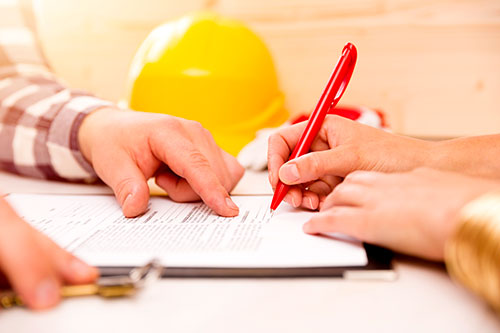As a builder, you have a lot to consider when it comes to insuring your business and the homes you build. Insurance costs are high, the options are seemingly endless and you want to make the best decision for your company.
Insurance isn’t optional, so here’s your quick guide to understanding some of the most common types of insurance for residential construction projects.
General liability insurance
General liability policies are the most common types of insurance protection in the construction world. As the name suggests, it’s a general policy that covers bodily injury and property damage (each term will be defined in detail in the policy).
Note that a general liability policy won’t cover the costs needed to repair defective work, just the damage that results from defective work. Different policies will have different exclusions, terms and conditions — make sure you read all of the fine print and ask any questions you have.
Builder’s risk insurance
These policies offer comprehensive protection against “named perils” and are specifically designed for buildings under construction. They cover the structure itself, materials and equipment. The exact perils named in the policy can vary, but they typically include coverage for events like fire, explosions, theft, vandalism, wind, lightning and hail.
A builder’s risk policy also contains common coverage exclusions, which are very important to understand. These exclusions most often include employee theft, earthquakes, flood damage, voluntary cessation of work and more.
Your insurance provider will work with you to choose the policy that best suits your business and the type of work you do. Many times, a builder’s risk insurance policy can be bundled into general liability coverage.
Professional liability insurance
This type of insurance is becoming more common amongst builders who act as designer-builders. If any of your residential construction projects involve a design component, the professional liability rests on you.
This type of coverage isn’t typically included under other types of insurance policies, so you’ll have to acquire it separately if needed.
Finding the right insurance provider
Selecting the best insurance provider is perhaps one of the most important parts of your insurance search. It’s always important to compare coverage specifics, costs and the quality of the company you might do business with.
Most national insurance providers are familiar with the construction industry, and you can also assess an insurance company and its ability to pay claims through A.M. Best, a reputable ratings company for the insurance industry. You can also speak with your local 2-10 Home Buyers Warranty representative for recommendations.
Additional risk management considerations for builders
Every builder should have a comprehensive risk management system in place, including insurance protection. The policies mentioned here don’t cover everything, though. That’s where warranty coverage is worth investigating.
Warranty coverage can fill in many of the gaps in your risk management portfolio. To learn more about your options, read this article about protecting your buyers and the homes you build.
Structural Warranties are part of a comprehensive risk management system that can protect builders and their buyers from devastating structural problems. Reduce your risk with 2-10 Structural Warranties for Home Builders, become a member today!








